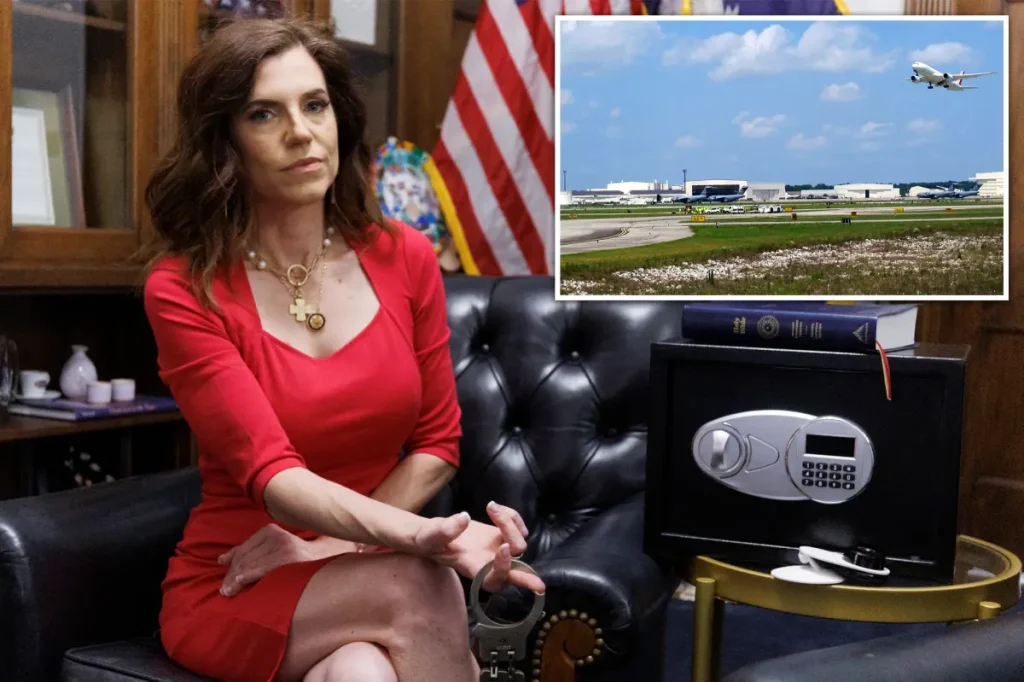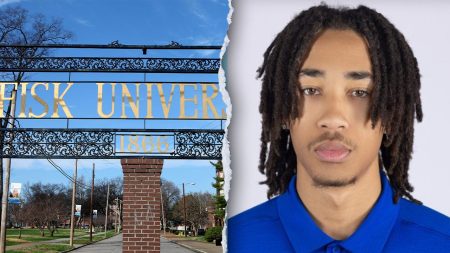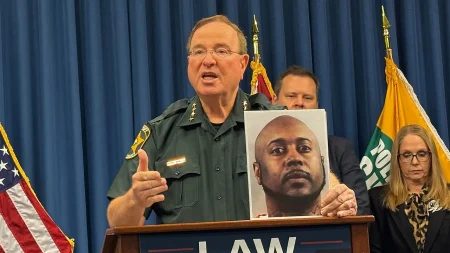Rep. Nancy Mace’s Airport Incident: A Closer Look at Public Conduct and Leadership
In a tense situation that unfolded at Charleston International Airport on Thursday, Representative Nancy Mace found herself at the center of controversy following an interaction with Charleston County Aviation Authority Police Department officers. According to an incident report obtained by The Post, officers had been assigned to escort the congresswoman to her gate but experienced a communication breakdown that seemingly escalated into a challenging encounter. The officers had been waiting for Rep. Mace’s arrival in what they expected to be a “white BMW,” but apparently missed her when she arrived in a BMW of a different color, as later confirmed by security footage. This miscommunication resulted in the officers locating Rep. Mace approximately 15 minutes after her anticipated arrival time, finding her waiting at the airport’s TSA Known Crewmember entrance. The report describes the congresswoman as “very irate” upon their meeting, setting the tone for what would become a documented difficult exchange between an elected official and law enforcement personnel simply performing their assigned duties.
What followed, according to the officers’ statements, was a walk to gate B-8 during which Rep. Mace allegedly expressed her frustration in ways that caught the attention of bystanders. Both officers provided similar accounts, claiming the congresswoman used profanity and made derogatory remarks about their competence and the department as a whole. One officer specifically noted Rep. Mace’s alleged statements that they were “f–king incompetent” and that “this is no way to treat a f–king US representative.” The report further indicates that the congresswoman was either dictating messages into her phone or speaking to someone about the situation throughout the escort. The officers’ accounts suggest that Rep. Mace’s demeanor was noticeable enough to leave an American Airlines gate agent “in disbelief,” while a TSA supervisor reportedly mentioned to the officers that Mace had spoken to TSA agents in a similar manner. One officer pointedly noted in the report that any other airport patron behaving in this manner would likely have been approached by department personnel to address such conduct.
In a particularly notable moment captured in the report, Rep. Mace allegedly stated that “Tim Scott would not be f–king treated this way,” referencing South Carolina’s junior Republican senator. This comparison raises questions about expectations of treatment for public officials and perceptions of protocol. Following the incident, Rep. Mace appeared to acknowledge the situation on social media, posting what seems to be surveillance footage of her arrival at the airport with the caption: “BREAKING NEWS: Nancy Mace arrives at the airport – with no security. Thank you for your attention to this matter!” This response suggests the congresswoman may have had concerns about security arrangements, though it doesn’t directly address the officers’ accounts of the interaction. The incident presents a moment that bridges personal frustration, public service expectations, and the realities of security protocols that apply to all travelers, including elected officials who may regularly navigate such systems.
The situation has predictably evolved into a political talking point, with South Carolina Attorney General Alan Wilson, who is running against Rep. Mace in the Republican primary for governor, quickly weighing in on the matter. Wilson characterized Mace’s alleged behavior as “unacceptable” and accused her of “disrespecting the men and women who keep our airports safe.” He further emphasized that “Law enforcement and TSA agents show up every day to protect the public, and right now they’re not even getting paid. They deserve respect and appreciation. Not profanity. Not threats. Not tantrums.” This statement situates the airport incident within the larger context of the ongoing campaign and frames it as a question of character and respect for public servants. Rep. Mace offered a sharp rejoinder to her political opponent’s criticism, writing on social media: “I wish Alan Wilson spent as much time prosecuting p*dophiles as he does spying on me at the airport,” effectively transforming what began as a report about airport conduct into another battleground in their gubernatorial primary contest.
Beyond the political dimensions, this incident invites reflection on the unique pressures faced by public officials and the standards to which they are held. Elected representatives frequently navigate busy travel schedules, security concerns, public recognition, and the constant scrutiny of constituents and media. These challenges, however, coexist with expectations that public servants will model respectful engagement with law enforcement, security personnel, and others performing their duties. The reported interaction raises questions about how stress, miscommunication, and perceived slights can sometimes manifest in public settings, and how such moments might affect perceptions of leadership. While every traveler has experienced frustrations with airport procedures, the visibility of public officials means their responses to such situations often become matters of public interest and, as in this case, political debate.
The incident also highlights the unique position of law enforcement officers who interact with public officials. The officers involved were tasked with providing a courtesy escort – a service reflecting the congresswoman’s position – yet found themselves documenting behavior they explicitly noted would have warranted intervention for an ordinary citizen. This tension between providing special accommodation while maintaining professional standards exemplifies the complex territory navigated by security personnel in public settings. Similarly, the reported reactions of airline staff and TSA personnel suggest that such interactions ripple beyond the immediate parties involved, potentially affecting workplace environments and public perceptions. The officers’ decision to document the encounter so thoroughly speaks to the significance they attached to it, preserving a record that would ultimately find its way to media outlets and the public discourse.
As this story continues to develop, it serves as a reminder of how brief interactions in public spaces can become magnified when they involve public figures. What might otherwise have been a forgettable moment of frustration between individuals has instead become fodder for political opponents, media coverage, and public commentary. For Rep. Mace, the incident represents a challenge to navigate as she continues her gubernatorial campaign, balancing any legitimate concerns she may have had about her airport experience with the public perception created by the officers’ account. For voters, it offers one of many data points to consider when evaluating candidates’ temperament and judgment. And for the officers involved, it underscores the increasingly complex nature of public service in an era where virtually any interaction may become subject to scrutiny and debate. Whether this incident fades quickly from public memory or remains a talking point in South Carolina’s gubernatorial race will depend on how the various parties continue to respond and what resonates with the voting public.










